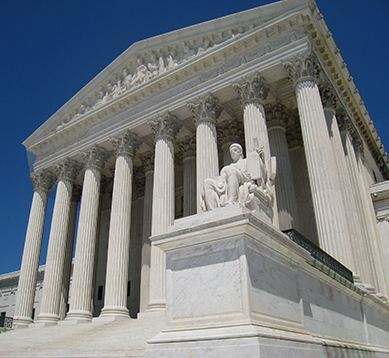The United States Supreme Court recently issued a 5-4 decision in three consolidated cases, Epic Systems Corp. v. Lewis; Ernst & Young LLP v. Morris; and National Labor Relations Board v. Murphy Oil USA, Inc., upholding the validity of class action waivers in employment arbitration agreements and expressly rejecting the National Labor Relation Board’s position that such waivers are unenforceable under the National Labor Relations Act (NLRA). In each case, an employee had entered into an arbitration agreement as a condition of employment that required individual arbitration to resolve employment disputes. Notwithstanding these agreements, each of the employees sought to pursue their claims as class actions under the federal wage and hour law known as the Fair Labor Standards Act.
The employees claimed that the class action waivers in arbitration agreements are unenforceable because they interfere with employees’ rights under the NLRA to engage in “concerted activities.” The employers countered that the Federal Arbitration Act (FAA) mandates that arbitration agreements must be enforced as written regardless of the NLRA.
The Supreme Court rejected the employees’ position and that of the NLRB, holding that arbitration agreements which bar class proceedings must be enforced. The Court held that Congress was clear when enacting the FAA: the courts must enforce arbitration agreements and “respect and enforce the parties’ chosen arbitration procedures.” The Court expressly rejected the NLRB’s argument that the language and purpose of the NLRA compelled a different result, adding that the NLRB’s position was not entitled to deference because it extended beyond interpretation of the NLRA.
The decision was far from unanimous. The four dissenting justices voiced concern that the Court’s ruling would lead to under enforcement of laws protecting employees because it would not be financially viable for most employees to pursue their claims on an individual basis. The majority retorted by pointing out that class actions can also “unfairly place pressures on the defendant to settle even unmeritorious claims.” The majority concluded, “the policy may be debatable but the law is clear: Congress has instructed that arbitration agreements like those before us be enforced as written.”
Employers may now rely on class action waivers in arbitration agreements to mitigate the risk of collective litigation. Employers who are concerned about the cost and practicability of defending class actions should immediately implement employment agreements requiring individualized arbitration.
If you need assistance reviewing your existing arbitration agreements or drafting new arbitration agreements in light of the Supreme Court’s decision, please contact Valerie Samuels or any other attorney in our Employment Group.
This Alert is provided for information purposes only, and does not constitute legal advice. According to Mass. SJC Rule 3:07, this material may be considered advertising. ©2018 Posternak Blankstein & Lund LLP. All rights reserved.



